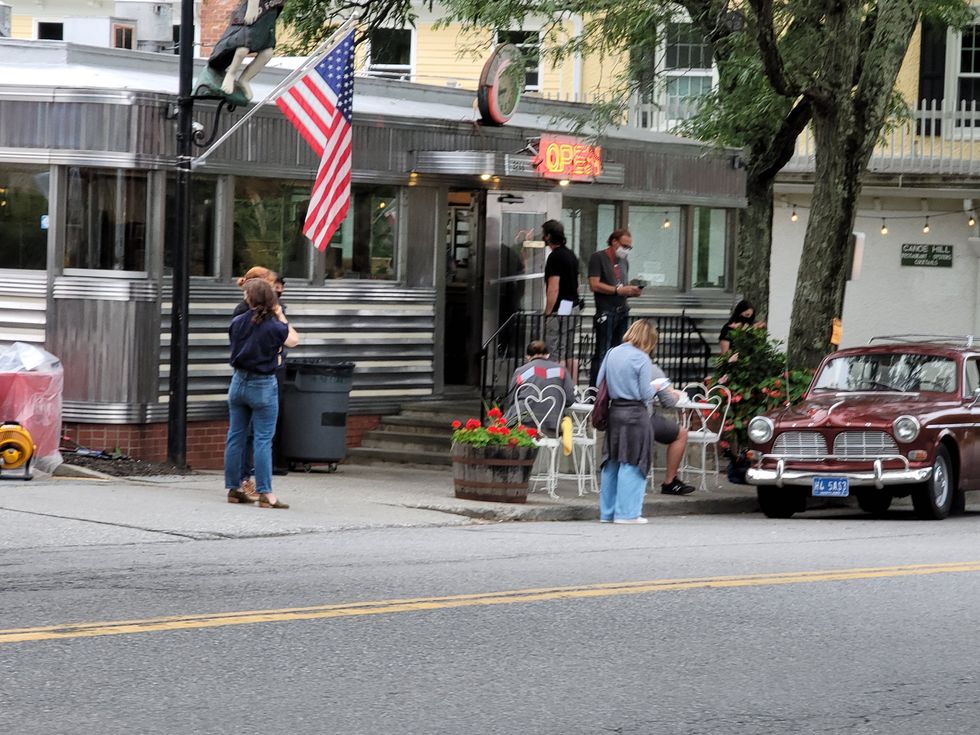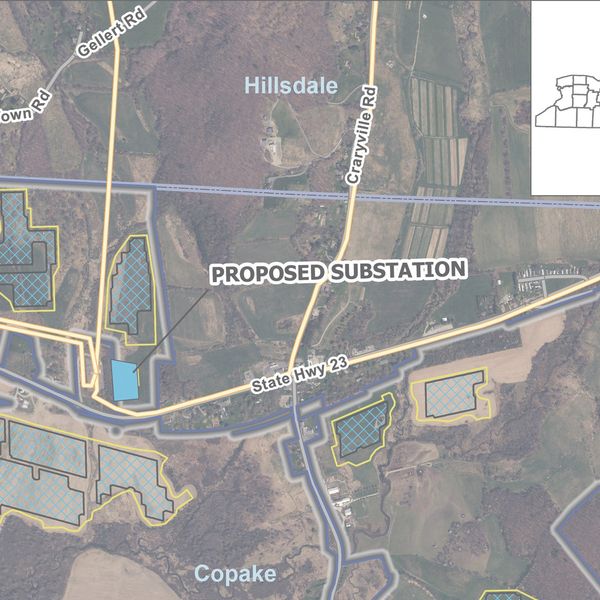MILLBROOK — The beauty of Dutchess County is well-known and film location scouts for movie and television are well aware of its appeal.
Here, you can have a forest, with deep woods, mountains, farms, and other rural and pastoral scenes. Then, five minutes away, you may find a charming village or a posh neighborhood with stately mansions and picturesque Victorian homes.
There are also a multitude of water possibilities such as lakes, rivers, ponds and fishing holes, not to mention covered bridges and massive bridges such as with Walkway over the Hudson, the Kingston Bridge and more.
While Red Hook and Rhinebeck seem to be perennial favorites, along with many other sites, Poughkeepsie has been central in more than one project, and Pleasant Valley and Millbrook have also had their 15 minutes of fame.
Actually, it was a lot more than 15 minutes. For instance, the five-part HBO series “The White House Plumbers” filmed in Millbrook, using Franklin Avenue and the Millbrook Diner.
“There was a lot of excitement and interest in the Village when HBO contacted us with a request to spend a few days to film some scenes from the subject movie in and around the Millbrook Diner,” said Millbrook Mayor Tim Collopy.
“Generous financial payments were made by the film company to those businesses that had to shut down for filming (the Millbrook Diner and Reardon Briggs Hardware) and some financial compensation was also provided to nearby businesses that were affected by shutting down Franklin Avenue.
The Village charged a flat fee which was to generously cover administrative costs as well as to pay premium rates for Village police traffic control.”
Of course, that’s the business end of it. What fun the Village residents had watching the filming!
The epic was “The White House Plumbers,” and extras were dressed in clothes from that period. Cars came from all over, also from that period, and were lined up in front of the diner, and up and down Franklin Avenue. The filming took several days.
The film, with an all-star cast including Woody Harrelson and Justin Theroux, tells the tale of how the Nixon administration ended up taking itself down.
Talking to the extras, and some of the car owners, it became evident that they not only got paid for their time and work, they loved doing it. Many of them have been in several movies and television films that have been done in this area. It was reported that more than 3,000 people answered the casting call for extras.
Collopy added: “While the film company was quite adept at crowd control and accommodating business needs, the biggest issues the Village had were that one, the scheduled film dates changed multiple times (even within a week of the last scheduled date), and two, the film crew needed to return for a second two-day period to complete filming.
“Despite the financial compensation, these changes caused a significant degree of frustration by business owners, residents and police such that the Board of Trustees will solicit input from the Millbrook Business Association and residents before allowing such future requests. We will also include a cancellation/reschedule fee as part of the contract terms.”
Knowing the interest of production companies in this area, Councilman Mike Murphy of the Town of Washington said of determining rates and rules for filming: “We have yet to address this issue. Hope to do so in the coming year.”
“This Much I Know Is True,” a six-part HBO special with Mark Ruffalo, was filmed mainly in and around Poughkeepsie, but some of the important parts were filmed at Pleasant Valley Estates on the Taconic, and mention was made of a major accident taking place on Route 22 between Brewster and Millerton.
The Taconic Developmental Disabilities Service Offices in Wassaic was also featured in several scenes.
In one scene, former state Sen. Sue Serino and the late Dutchess County Sheriff Butch Anderson and his wife, Danielle, are shown playing a psychiatric review board.
The Dutchess County Film Commission has listed more than 500 productions as having been filmed, all or in part, in the Hudson Valley. This, of course, is a huge area, but as more people visit, it is becoming better known and could see more and more activity from film companies.
There are several film companies that have already made the Hudson Valley their home, and proximity to New York City is a factor.
Casting calls are not uncommon in Dutchess County anymore, and many professionals in related fields have made this area their home.








 Lisa CameronPhoto Provided
Lisa CameronPhoto Provided




Village Trustees hear call to adopt law to limit local cooperation with ICE
Barbara Graham of Millerton speaks to Village trustees, Mayor Jenn Najdek and Millerton Police Chief Joseph Olenik during a May 21 special meeting.
MILLERTON — The Village of Millerton board of trustees held a special meeting on Wednesday, May 21 that drew an unusually large crowd. Nearly 20 residents and supporters showed up to urge officials to adopt a local law aimed at protecting immigrants, including undocumented community members.
The law, as proposed by meeting attendees, would limit cooperation between local law enforcement and U.S. Immigration and Customs Enforcement.
While no resolution was reached, Mayor Jenn Najdek agreed to schedule a follow-up special meeting where the public can speak with Village legal counsel and explore the proposal in a more practical, informed setting. The yet-to-be scheduled meeting is expected to take place sometime in June, according to Najdek.
The meeting addressed ongoing ICE activity in the Hudson Valley and throughout the country, primarily reports of arrests made without judicial warrants and alleged misidentifications. Millerton’s police department, which operates on a limited, part-time basis, is not typically involved in immigration enforcement, but residents said clear local guidelines are necessary before an event or arrest occurs.
“Our village has a moral imperative to do everything in its power to protect the rights and dignity of immigrants who live and work in our community,” said Barbara Graham, a Millerton resident of 14 years.
Graham spearheaded an email to Mayor Najdek and the Village board that to get on the Board’s agenda. Co-signed by six Millerton residents and 11 supporters, the letter urged the board to “affirm its commitment to justice, constitutional rights, and community trust.”
Wearing a homemade lapel pin that read, “Well-being for all beings,” Graham read aloud from the group’s letter. Najdek then opened the floor for public comment.
“I don’t think anybody here is asking the Village to tell the police how to do their job,” said Bill Kish of the Town of North East. “What we’re asking is that the Village provide clear guidance in the form of local law…that unless a judicial warrant is provided, the police will not use any of their resources to help.”
Eliot Ramos, a Village resident, added, “Newcomer or lifelong local, adopting a law that bars our police from collaborating with ICE is an act of partnership and moral leadership that honors due process.”
Trustees and community members alike noted the limited effect a law of this nature might have at the local level. Still, the response from meeting attendees was unanimous. Andres Vialpando, who said he was born and raised in Millerton, noted a law would carry weight even as a symbolic gesture.
“I’d be proud to say that my village is standing up for what I would call good and healthy laws,” Vialpando said. “I support this initiative, even if it seems like, at some level, it could be unnecessary.”
Though the discussion was scheduled for 15 minutes, it continued for nearly an hour. Following public comment, Najdek, the four Village trustees and Police Chief Joseph Olenik addressed the concerns.
They noted the cost of legal consultation — estimated at $5,000 according to Najdek — could strain an already tight budget. Officials also noted the potential repercussions of adopting such a law, including the loss of federal funding for infrastructure projects like sidewalks and sewer upgrades.
“We’re doing our work, applying for grants, applying for funding, getting projects completed,” said Najdek. “My concern is that we’re putting a spotlight on us that could impact funding over the next five years. It’s a real concern for a village of our size.”
Throughout the meeting, questions arose about the legal interplay between local, state and federal jurisdictions. Residents pressed for specifics about what would happen if ICE entered the village. Chief Olenik offered a limited response.
“At this point in time, I would be assisting them,” he said. “I wouldn’t be making the arrests, but I would be assisting them with whatever they would need us to do as Village PD.”
He added that he would not hinder an investigation or withhold information from the State Police, the Sheriff’s Office or ICE.
Weighing the risks and rewards of pursuing such a law, Najdek responded emotionally: “I want to do my job. I want to keep my head down. I want to do the right thing for the Village the best I can.”
Other items addressed during the special meeting included the approval of $99,498.99 in vouchers from April and May; the delivery and acceptance of department reports; approval of previous meeting minutes; and a discussion of Express Bill Pay, a new software system that will allow residents to pay utility bills online by credit card or e-check.